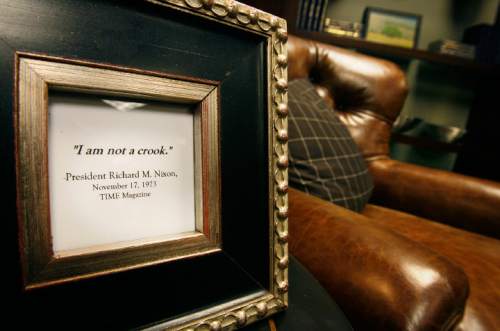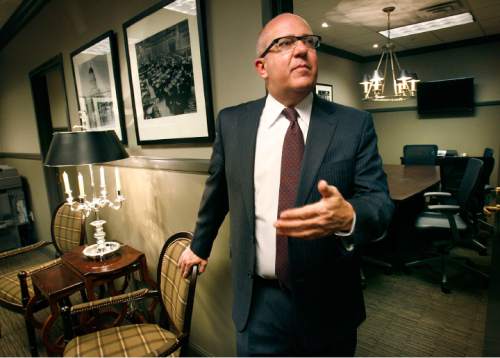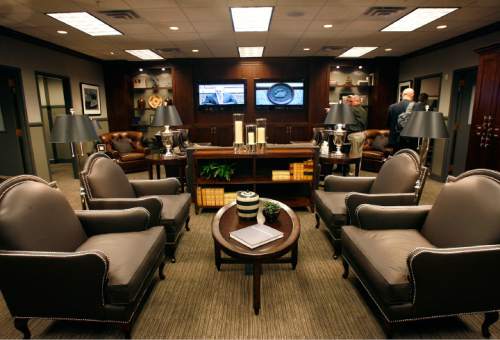This is an archived article that was published on sltrib.com in 2015, and information in the article may be outdated. It is provided only for personal research purposes and may not be reprinted.
The venerable American Legion has enjoyed free office space in the basement of the Utah Capitol since World War I. But a state board voted Monday to try to get the organization to move — so it can rent more space to lobbyists.
No one talked to the Legion about that before the Capitol Preservation Board voted 7-1 on Monday to seek to negotiate moving lobbyists into its space.
"It's disconcerting that they would discuss this kind of deal without approaching us beforehand," Greg Rowley, Utah adjutant for the American Legion, said when he learned about the plan from a Tribune reporter.
He said the Legion uses its small Suite 80 in the Capitol basement to run all its operations with three employees. "We run Boys' State, Girls' State, Legion baseball. We coordinate everything out of that office [for 98 veterans' posts], and have done so for 90 years. ... We do a lot for the state."
Preservation board staff said they wanted first to ask the board if it had any interest in helping lobbyists expand their rented space before approaching the Legion. Staffers told the board they will now see if the Legion would be willing to move elsewhere.
Rowley said the Legion wants to stay put, especially because, when the Capitol was renovated a few years ago, the Preservation Board made it "purchase a specific kind of furniture … that was kind of built in and it cost us $30,000 to outfit the office in a scheme and a way that was amenable" to the board. He said the Legion can't afford to move.
The space tussle arose when the Capitol Hill Association of lobbyists sought to expand its current 1,800 square feet of space, located across the hall from the American Legion.
Jodi Hart, association president, says her group pays about $40,000 a year to rent its present suite. It is a posh place where lobbyists can bring legislators and others for meetings, and have places to work, make calls, prepare food or watch TV.
She told the board that her group "has run out of space" for its current 35-member lobbying groups — who pay $4,500 per organization to join, and about $1,000 per person in annual dues — and has a waiting list of six groups that want to join. The association proposed expanding into storage space next to its suite to add a few more conference rooms.
But Allyson Gamble, executive director of the preservation board, said the state uses that storage space extensively, and does not want to get rid of it. She proposed seeing if the American Legion might be willing to relocate instead — if the board was willing to rent more space to lobbyists.
Lt. Gov. Spencer Cox, chairman of the preservation board, said no one is sure why the American Legion was given free space for so long. He guessed that after World War I, it acted as sort of an unofficial department of veterans affairs for the state — and then just stayed.
Rowley told The Tribune that legislation in the 1920s gave the Legion and other service organizations free space, but said if they moved, they had no guarantee they could regain the space. "We're the last ones here," he said.
Hart said it was not her lobbyists' group that proposed moving into the American Legion space. And now, "We only want to proceed if they are amenable. We're not going to displace them unwillingly."
She added that it was "unfortunate that they had not been consulted beforehand, but that was not our doing."
Only one member of the preservation board, Rep. Patrice Arent, D-Millcreek, expressed any hesitation about renting more space to lobbyists.
She noted that earlier in the meeting, the board had taken away an office from Capitol dining staff to make another public conference room because "there is a dire need" for more such space for the public to rent on occasion.
If that is the case, Arent said it may not make sense to set aside space permanently for wealthier lobbyists who can afford to join the Capitol Hill Association — leaving others to fend wherever they can in public spaces.
Arent said the state should not focus just on money from lobbyists' rent. "This needs to be about what's best for the use of our public house."
"I'm going to take exception to that," said Rep. Brad Dee, R-Ogden, a board member. "I'm not going to stand for it. I've heard [from her] that it's all about money."
Dee said it is about renting fairly to groups that need access.
"If you've got groups that you feel are not accessible to that area, then have them bid on the space," he said. "It's about treating everybody fairly across the board."
Arent responded, "I want to make sure if there is a desperate need [for public space], we are looking at the big picture."
Hart said before Capitol renovation, the entire basement was rented to a variety of lobbying groups. She said they have all merged into the joint space that her group now rents.







